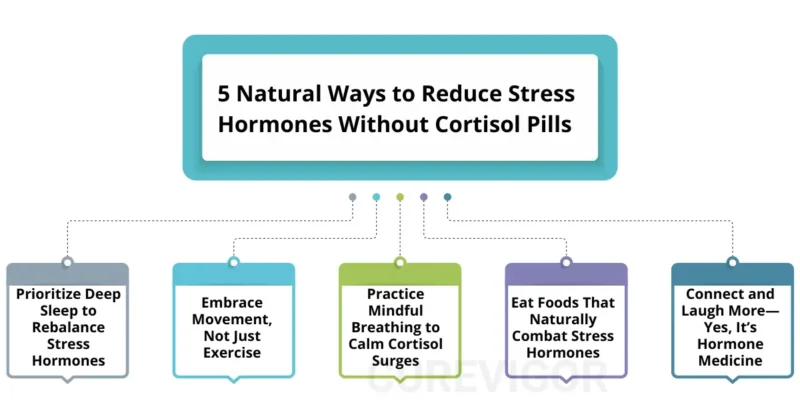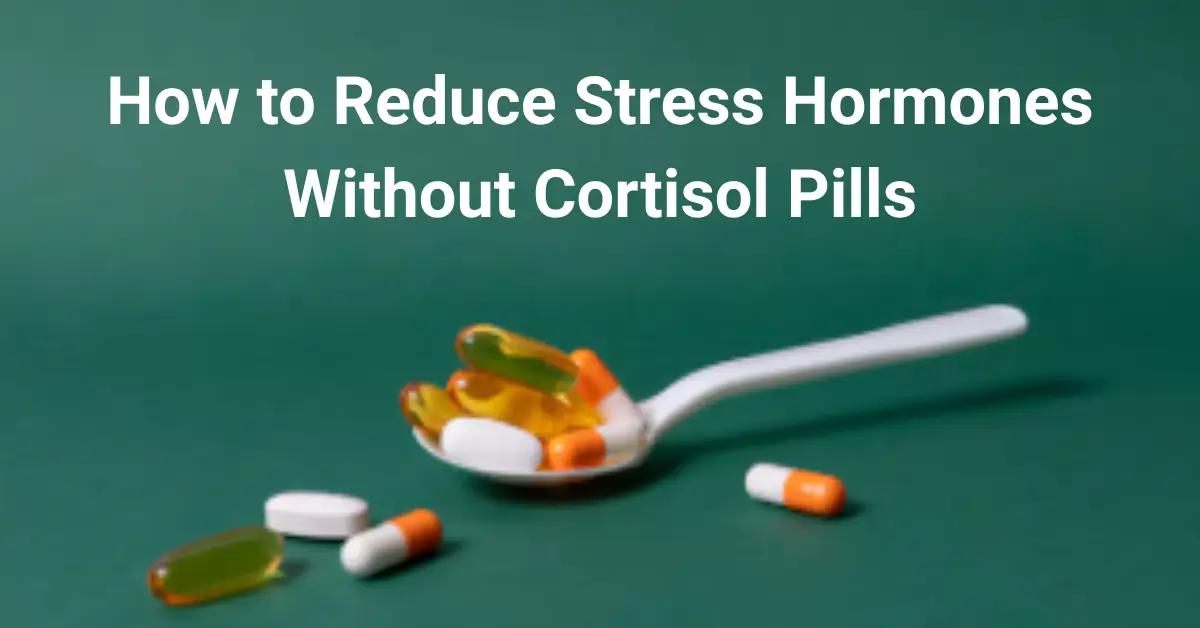Find out 5 natural, effective ways to reduce stress hormones without cortisol pills. Learn how to restore balance with sleep, food, movement, breathwork, and laughter.
Thank you for reading this post, don't forget to subscribe!In today’s fast-paced world, stress hormones—especially cortisol—can quietly take a toll on your mind and body. While cortisol plays a crucial role in managing your energy and alertness, chronic elevation can lead to weight gain, insomnia, fatigue, and even burnout.
But here’s the good news: you don’t need prescription pills to restore balance. There are natural, sustainable ways to reduce stress hormones and feel more grounded and energized.
5 Natural Ways to Reduce Stress Hormones Without Cortisol Pills

Let’s explore five research-backed and lifestyle-friendly strategies to naturally lower your cortisol levels—no medication required.
1. Prioritize Deep Sleep to Rebalance Stress Hormones
Sleep isn’t just rest—it’s your body’s nightly reset button for stress hormones. When you fall into deep, restorative sleep, your cortisol levels naturally drop, allowing your body to repair tissues, regulate metabolism, and restore emotional balance.
But when sleep is short, restless, or interrupted, your brain interprets it as a threat, causing stress hormones to spike and stay elevated throughout the next day. This is why poor sleep often leaves you feeling anxious, foggy, and irritable.
One overlooked aspect is your sleep-wake cycle, also known as the circadian rhythm. Cortisol is highest in the morning to help you wake up and should decline as the evening approaches.
But staying up late with bright lights, scrolling on your phone, or drinking caffeine in the afternoon tricks your body into thinking it’s still daytime. The result? Cortisol refuses to shut off, and melatonin—the sleep-inducing hormone—never fully takes over.
Creating a bedtime ritual is one of the simplest yet most effective ways to regulate stress hormones. Start by dimming your lights an hour before bed to mimic natural sunset. Replace late-night doom-scrolling with calming practices like journaling, light stretching, or listening to soothing sounds. Even something as simple as lowering your room temperature to 65–68°F (18–20°C) signals to your body that it’s time for deep rest.
Herbal teas like chamomile, passionflower, or ashwagandha can also support relaxation without relying on pills. These natural remedies not only calm the nervous system but also gently encourage cortisol to quiet down. Pairing them with consistent sleep and wake times—even on weekends—creates a rhythm your stress hormones can depend on.
Think of sleep as your nightly detox for stress: it clears mental clutter, restores energy, and gives your adrenal glands permission to rest. With deep, quality sleep, you wake up not only refreshed but also protected from the draining effects of elevated stress hormones.
2. Embrace Movement, Not Just Exercise
When people think of exercise, they often imagine sweating it out in the gym or pushing through high-intensity workouts. But when stress hormones are already running high, adding more physical strain can sometimes backfire.
Intense training, especially without proper recovery, tells your body it’s in danger, which can actually push cortisol levels higher. That’s why gentle, enjoyable movement is often the smarter, more sustainable choice when you’re trying to bring stress hormones back into balance.
Movement works best when it feels safe and joyful. A quiet walk in the park, for instance, combines the benefits of physical activity with the calming power of nature.
Studies show that walking among trees or near water reduces cortisol faster than walking in a crowded urban street. Similarly, dancing in your living room to music you love releases endorphins—your body’s natural feel-good chemicals—while signaling to your nervous system that it’s time to relax.
Yoga is another powerful tool. Unlike aggressive workouts that activate the stress response, yoga lowers blood pressure, slows your heart rate, and reduces the constant flood of stress hormones.
Even a short, 15-minute flow of gentle poses and deep breathing can flip your body from fight-or-flight mode into rest-and-digest mode. If yoga isn’t your style, simple stretching while listening to calming sounds or guided relaxation music can deliver the same soothing effects.
The key is consistency, not intensity. Movement done with mindfulness—whether it’s gardening, swimming, or playing with your dog—creates a rhythm of safety and relaxation in your body. Over time, this helps retrain your adrenal glands to stop pumping out excess cortisol. Think of it as moving your body not to “burn calories,” but to teach your stress hormones how to soften and settle.
3. Practice Mindful Breathing to Calm Cortisol Surges
Breathing is the one function of the body we can control both consciously and unconsciously, and it has a direct line to our stress hormones. When you’re anxious or under pressure, notice how your breath becomes shallow and rapid.
This sends a message to your brain that danger is near, which keeps cortisol flowing. By contrast, slow, intentional breathing tells your nervous system that the threat is over, allowing cortisol to settle and balance.
One of the most effective techniques is diaphragmatic breathing, also known as belly breathing. Instead of breathing only into your chest, you expand your abdomen as you inhale, filling your lungs completely. This action stimulates the vagus nerve, which activates the parasympathetic nervous system—the “rest and digest” state that directly lowers stress hormones.
A powerful method you can try is the 4-7-8 technique: inhale through your nose for 4 seconds, hold your breath for 7 seconds, and exhale slowly through your mouth for 8 seconds.
This extended exhalation is crucial—it signals safety to your body and helps flush excess carbon dioxide, calming the brain and lowering cortisol. Just a few rounds can ease muscle tension, clear mental fog, and improve focus.
Another option is box breathing, often used by athletes and even Navy SEALs to stay calm under pressure. Inhale for 4 seconds, hold for 4, exhale for 4, and pause again for 4. This creates a steady rhythm that regulates stress hormones and helps you feel grounded.
The beauty of mindful breathing is that it’s always available. You don’t need equipment, supplements, or a special setting. You can do it while waiting in traffic, before a big meeting, or as part of your morning routine.
Over time, consistent breathing practice rewires your nervous system to respond differently to stress. Instead of cortisol spiking with every challenge, your body learns to stay calm and balanced.
Breathing is more than just survival—it’s a natural prescription your body gives you to tame stress hormones without pills. With practice, each breath becomes a tool to reset your mind, steady your heart, and invite peace back into your day.
4. Eat Foods That Naturally Combat Stress Hormones
Your diet is more than fuel—it’s also a message to your hormones. Every bite you take signals your body to either calm down or ramp up stress hormones like cortisol.
Skipping meals, relying on processed foods, or leaning heavily on caffeine and sugar tells your body that food is scarce, a subtle stressor that drives cortisol higher. On the other hand, balanced, nutrient-rich meals reassure your system that it’s safe, stable, and supported.
Whole foods are your allies. Omega-3 fatty acids found in salmon, walnuts, and chia seeds nourish the brain and reduce inflammation triggered by chronic stress.
These healthy fats act as a buffer, keeping cortisol from spiking excessively during tough moments. Antioxidant-rich fruits like blueberries, cherries, and oranges help combat oxidative stress, protecting your cells from the wear-and-tear caused by prolonged high stress hormone levels.
Magnesium-rich vegetables—such as spinach, kale, and pumpkin seeds—are especially powerful. Magnesium is sometimes called the “relaxation mineral” because it soothes the nervous system, lowers blood pressure, and helps regulate cortisol production.

Many people unknowingly run low on magnesium, which worsens anxiety, fatigue, and muscle tension. Adding leafy greens or a handful of seeds to your meals can be a simple but effective way to balance stress hormones.
Protein also plays a vital role. Lean sources like chicken, lentils, and beans stabilize blood sugar, preventing the spikes and crashes that push cortisol into overdrive. Pairing protein with slow-digesting carbs such as oats, quinoa, or sweet potatoes gives your body steady energy without overtaxing your adrenal glands.
Even small indulgences can help. A square or two of dark chocolate with at least 70% cacao has been shown to lower cortisol while boosting mood through natural compounds that increase serotonin. Unlike processed sweets that cause sugar crashes, dark chocolate offers antioxidants and a gentle sense of comfort.
Finally, hydration is often overlooked. Dehydration itself is a form of stress, and when your body lacks water, cortisol rises to keep systems functioning. Sipping water throughout the day—especially infused with calming herbs like mint or slices of cucumber—keeps your body refreshed and signals safety to your stress hormones.
In short, food isn’t just nourishment; it’s therapy for your hormonal balance. Choosing the right ingredients can calm your nervous system, lower stress hormones naturally, and help you feel resilient against daily challenges.
5. Connect and Laugh More—Yes, It’s Hormone Medicine
We often think of stress management as something solitary—meditation, exercise, or sleep. But one of the most powerful ways to regulate stress hormones is deeply human: connection.
Our bodies are wired for relationships, and when we share moments of trust, affection, or laughter, something remarkable happens. Oxytocin—the bonding hormone—rises, and cortisol begins to fall. It’s nature’s built-in balancing act.
Think about how you feel after venting to a close friend. The problem itself may not disappear, but your shoulders loosen, your heartbeat slows, and the weight feels lighter. That’s not just emotion—it’s biology. A heartfelt conversation triggers oxytocin, which directly counteracts the effects of stress hormones on your body.
Physical touch is even more powerful. A warm hug, holding hands, or cuddling with a pet sends calming signals to the brain, lowering blood pressure and reducing cortisol in real time. Studies show that even brief moments of affectionate touch can shift your nervous system from “fight or flight” to “rest and repair.”
And then there’s laughter—one of the simplest yet most overlooked therapies. When you laugh, your brain floods with endorphins, your muscles relax, and cortisol drops almost instantly.
Whether it’s watching a comedy show, sharing jokes with friends, or replaying a funny memory, laughter creates a ripple effect of calm. It doesn’t just distract you from stress—it physiologically resets your hormonal balance.
On the flip side, isolation and loneliness keep stress hormones elevated. Without connection, your body stays in a protective mode, as if danger is always near. That’s why building community—whether through family dinners, volunteering, spiritual gatherings, or even online support groups—is more than emotional nourishment; it’s hormonal medicine.
The beauty of connection and laughter is that they don’t require supplements, prescriptions, or complicated routines. They’re free, accessible, and woven into everyday life. By making space for joy, companionship, and shared moments, you’re not just improving your mood—you’re teaching your stress hormones how to settle, soften, and release their grip on your body.
FAQs on How to Reduce Stress Hormones Without Pills
Q. What are stress hormones, and why do they matter?
Stress hormones, mainly cortisol and adrenaline, are chemical messengers your body releases during challenging situations. In small amounts, they’re essential for energy, focus, and survival.
But when stress hormones stay elevated for too long, they can disrupt sleep, weaken immunity, increase belly fat, and drain your energy. That’s why finding natural ways to keep stress hormones balanced—through sleep, nutrition, movement, and relaxation—is key for long-term health and emotional stability.
Q. Can I reduce stress hormones without taking cortisol pills?
Yes, you can absolutely reduce stress hormones without cortisol pills. Your lifestyle choices play a huge role in how much cortisol your body produces. Prioritizing quality sleep, practicing deep breathing, eating whole foods rich in magnesium and omega-3s, and building strong social connections are proven, natural methods.
Unlike pills that may mask symptoms, these approaches address the root cause of stress, helping you restore balance and resilience without side effects.
Q. How quickly can stress hormones go down naturally?
The time it takes to lower stress hormones naturally depends on your habits and current stress levels. Simple techniques like mindful breathing or a walk in nature can reduce cortisol in just minutes.
Consistent changes—like improving your sleep routine, eating balanced meals, and practicing daily relaxation—create long-term hormonal balance. With regular effort, most people notice reduced stress symptoms, better energy, and calmer moods within a few weeks, without needing cortisol pills.
The Bottom Line: How to Reduce Stress Hormones Without Cortisol Pills
Balancing your stress hormones doesn’t have to rely on medication. Your body is designed with natural tools to regulate cortisol, and the way you live each day shapes how those hormones behave. Deep, restorative sleep allows cortisol to reset overnight.
Gentle movement and mindful breathing calm your nervous system in minutes. Whole, nutrient-rich foods feed your body the building blocks it needs to keep stress hormones in check. And human connection—through laughter, hugs, or heartfelt conversations—provides the emotional medicine that no pill can replace.
The truth is, you already carry the antidote to high stress hormones within your daily choices. By weaving these practices into your routine, you can lower cortisol naturally, feel lighter, and build lasting resilience against life’s pressures—without ever reaching for cortisol pills.
Read more Health and Wellness Tips.
You might love:

